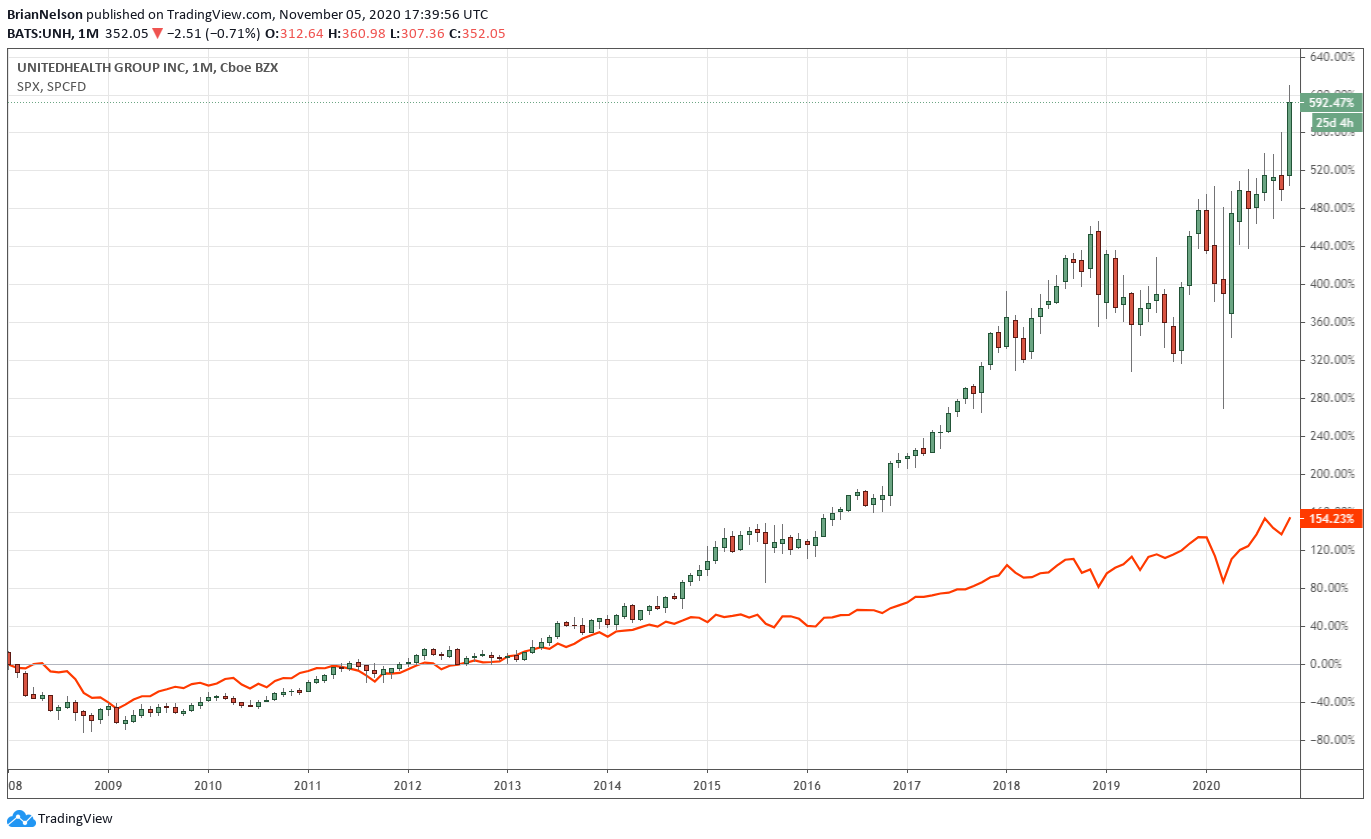Member LoginDividend CushionValue Trap |
UnitedHealth Remains on Our Radar for Dividend Growth Newsletter Portfolio
publication date: Nov 5, 2020
|
author/source: Brian Nelson, CFA
Image: On a price-only basis, from the beginning of 2008, UnitedHealth’s shares have advanced ~600%, while the S&P 500 has increased ~150%. The measurement period covers both the Obama and Trump administrations. By Brian Nelson, CFA UnitedHealth Group (UNH) is a name that we don’t dedicate a lot of resources to, as we tend to prefer diversified exposure to the healthcare arena in both the Best Ideas Newsletter portfolio and Dividend Growth Newsletter portfolio via the Healthcare Select Sector SPDR (XLV)--UnitedHealth Group is a ~8% weighting in the ETF at the time of this writing. Nonetheless, this Dow Jones Industrial Average (DIA) component has been under material accumulation of late based on its pricing action. Year-to-date, on a price-only basis, UnitedHealth’s stock has advanced more than 20%, while shares are up over 40% during the past 12 months. On a price-only basis, the S&P 500, by comparison, is up ~7% so far this year and ~12% during the past 12 months. Over longer measurement periods, the degree of return outperformance is even more impressive. Here’s some background on the company: (UnitedHealth Group operates) two distinct, but strategically aligned, business platforms: health benefits operating under UnitedHealthcare and health services operating under Optum. UnitedHealthcare provides health care benefits to an array of customers and markets. Optum is a health services business serving the broad health care marketplace, including payers, care providers, employers, governments, life sciences companies and consumers, through its OptumHealth, OptumInsight and OptumRx businesses. Through UnitedHealthcare and Optum, in 2019, (it) processed nearly a trillion dollars in gross billed charges and (it) managed more than $250 billion in aggregate health care spending on behalf of the customers and consumers (it) serve(s). (Its) revenues are derived from premiums on risk-based products; fees from management, administrative, technology, consulting and managed outsourced services; sales of a wide variety of products and services related to the broad health care industry; and investment and other income. During United Health’s third quarter, results released October 14, the company’s revenue advanced 8% thanks to a 21% surge in sales at Optum. Net earnings faced some pressure on a year-over-year basis as UnitedHealth experienced increased “direct COVID-19 care and testing costs” as well as disruptions in care patterns as a result of the pandemic, but it did note that patterns are moving closer to “normal levels.” Bottom-line trends seem to be resilient, in any case, with the company raising its full-year adjusted earnings per share outlook for 2020 to the range of $16.50-$16.75, up from the prior range of $16.25-$16.55. Year-to-date return on equity came in at a very healthy 28.9%, reflecting robust economic value creation. UnitedHealth is one healthy company. Cash flow from operations advanced to $16.1 billion during the first nine months of 2020 versus $12.3 billion in the same period a year ago. Capital spending held in the range of $1.4-$1.5 over the comparable nine-month periods, with free cash flow generation thereby exploding on a year-over-year basis handily covering cash dividends paid. UnitedHealth’s balance sheet is also net-cash-rich, with the firm ending the quarter with $20.8 billion in cash and short-term investments and $39.2 billion in long-term investments (about $60 billion in cash and short-term/long-term investments). Short and long-term debt came in at $43.8 billion at the end of the quarter. Concluding Thoughts UnitedHealth offers investors defensive characteristics, and the company has revealed considerable resiliency in the face of the COVID-19 pandemic, as well as through changes in healthcare laws during prior administrations. Strong earnings momentum (i.e. the recent guidance increase), solid and growing free cash flow generation, and a very healthy balance sheet are key components to its story. The company has put up sizable double-digit dividend increases in recent years, and we believe it has the capacity to continue to do so. Free cash flow generation during the first nine months of 2020 covered dividends paid by a factor of 4.2x. At 21x expected 2020 earnings, UnitedHealth isn’t too pricey in light of its free cash flow generation and balance sheet health, and its ~1.6% dividend yield isn’t too shabby, by any stretch either. We have exposure to the company via the Healthcare Select Sector SPDR ETF, but we’re keeping UnitedHealth on our radar for addition to the Dividend Growth Newsletter portfolio at the right price. ---
---
Related: CVS, EHTH, GTS, MOH, HUM, CI, ANTM, ABC, CAH, WBA
---
Valuentum members have access to our 16-page stock reports, Valuentum Buying Index ratings, Dividend Cushion ratios, fair value estimates and ranges, dividend reports and more. Not a member? Subscribe today. The first 14 days are free.
Brian Nelson owns shares in SPY, SCHG, DIA, VOT, and QQQ. Some of the other securities written about in this article may be included in Valuentum's simulated newsletter portfolios. Contact Valuentum for more information about its editorial policies. |



1 Comments Posted Leave a comment